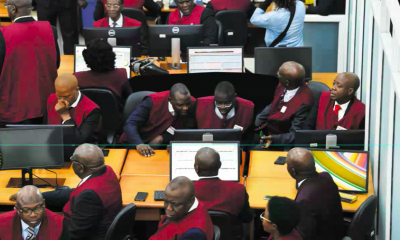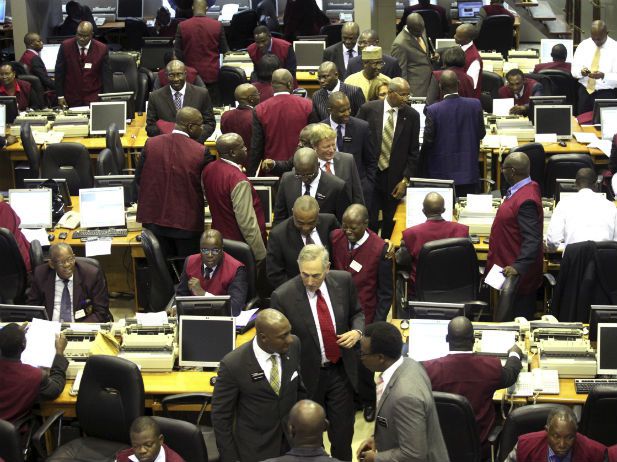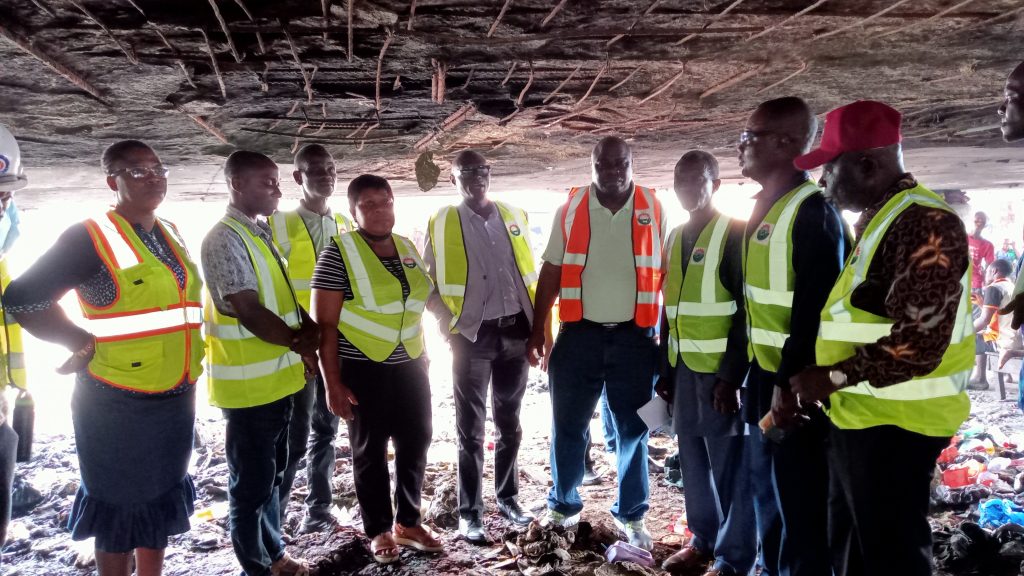Business
We should focus on People, Planets and Profits – Owolabi
Published
8 years agoon
By
Olu Emmanuel
Recently, the Nigerian Stock Exchange(NSE) and Ernst & Young, one of the ‘Big Four’ audit firms globally, gathered Chief Executives across the country to discuss issues pertaining to sustainability reporting. In this interview with Chioma Obinagwam, Senior Manager, Financial Accounting Advisory Services, Climate Change and Sustainability Services, Joseph Owolabi, spoke extensively on the benefits of Sustainability Reporting to the bottomline of any organisation, the need to focus on the Tripple Ps, among sundry issues.
In your slides, you talked extensively of the importance of Sustainability reporting to the bottomline of any business?
I think the issue here is that, globally, sustainability used to be a ‘nice to have’ but right now, it has gone beyond that. Exchanges, globally, are beginning to demand that you embed environmental, social and governance issues into your reporting.
Gone are the days where you have to just report financial information. Now, non-financial information becomes very important. So you are looking at things like social issues. How do you treat your employees, your customers? Product reliability, engagements with your customers; ensuring that you service them well and after service and all of those things. You could create value by doing that.
You also want to ensure that you don’t damage the environment. You want to protect the planet. How do you use water? How do you conserve resources that are limited. There have been a lot of cases of drought in Australia and San Fransisco, even in some parts of Africa rainfall has not been constant because of the global warming issue. So, these are issues that are upon us and we cannot shy away from them.
You findout that apart from some fines, which we mentioned, even for you to do business, there is a social license that the community would give to you based on your engagement, not just you being a part of them, not just extracting benefits from that community but also giving back to them and the environment.
I’d like you to explain in your own words what sustainability reporting means?
Sustainability is the ability of an enterprise to capture details, material issues that are important to them and are very critical for their business around environmental concerns. Issues like releasing of gasses like, carbon di oxide, carbon monoxide, and other poisonous gases into the environment.
I want to look at social issues. Things like labour. How do you treat your people? Human rights. A similar regulation just came out in the United Kingdom(UK), which is also impacting on companies in Nigeria that has presence in the UK.
You also want to look at things around health and safety as well as governance. So, your ability to capture these material issues and reflect on your impact on this issue and the impact they have on your business is what sustainability is all about. So that stakeholders will understand what you are doing and be able to measure your performance.
Has the government been supportive in your crusade?
It is early days in Nigeria. There is a regulatory bite. That is why we have fora like this, where we can talk to regulators to see how they can also bring disclosure requirement.
In Nigeria currently, we have what we call the sustainability requirement principle, which is required of the banks, some development bank, mortgage banks, etc. Where they have to comply with the issues I’ve discussed about- the environment, social issue and governance issues.
We also have the requirement from Securities and Exchange Commission(SEC) of Nigeria, that organisations should reflect what they are doing around social issues. These are some of the pockets of regulation that we already have. So, we expect more.
In Paris, over 150 leaders will gather to debate on climate change. About 146 countries have already sent their plan on how they want to curtail these emissions. You expect to see at the backdrop of the Paris UN delegation, more action from the government, environmentalists and also social workers to see how we can curtail this economic and environmental impact. The government should engage more. It will be good to see the government setting principles and making laws that would encourage sustainability reporting.
Recently, President. Mohammadu Buhari of Nigeria appointed his Ministers. What kind. Of support do you expect from them, particularly, those whose portfolio bothers on what you have highlighted so far?
From the Ministry of Environment, you expect that it cuts across that. There is a Ministry of Women Affairs; there is Youth. It cuts across a number of ministries. And even Housing. So, it doesn’t just sit in one ministry.
Across Europe now there are rules as to what materials you use in building. There are a lot of building collapse that happens in Lagos, especially around Yaba and those areas, where people get buried under the debris.
So, sustainability is also embedded in the architecture of building itself. What materials do you use? Are they strong enough? Are they materials that will not damage the environment and are not poisonous? So, it cuts across a lot of ministries. Everyone looking beyond profits. We are talking about the tripple Ps: Planets, People and Profits.
So, rather than focus on profits, we focus on those tripple Ps. You preserve the Planets. For instance, you don’t just keep wasting water. You can recycle and you can also manage what you use and all of that. People: how do you treat your employees, workers and suppliers. How do you engage better with the community? Profits: yes you make profits because organisations do not exist just for charity purpose.
Sustainability is not saying you should not make profit. This is because if you are not profitable, you cannot pay your employees and fulfill your financial obligations in terms of government taxes.
What format, template or components do we expect the sustainability report to have compared to what we have in a typical financial statement and what is obtainable in other climes?
It would be quite premature to rather suggest that. Across the world, in Europe and other parts of the world. You find that a lot of countries are going with the principles based, where you either comply or you explain. It gives you room to also get to carry people along. So that people can see and start reporting when they begin to see the benefits. They can move on to that, rather than doing the rules based. However, in places like the United States of America, where they have the rules based. The Environmental Protection Agency in this country, which is the agency that exposed Volkswagen in the recent integrity issue. They are more rules based. For example, your emission should be below this. You must report this issue. So, if you float that, it is easier to punish you where as for the principle’s based you can hide under and it is neither here or there.
Nevertheless, it is always good to start with the principled base. But as you go on, you can come up with specific rules for some industries like the Oil and Gas, where there are emissions and say no more gas flaring and all of that. But generally, I think to encourage participation from all stakeholders, you might need to start with the principled base.
Since sustainability reporting is rather new in this part of the world, what efforts are you making to ensure that you educate and enlighten the public?
And that is why we are doing this. Ernst and Young, my employer partnered with the Nigerian Stock Exchange(NSE) spent almost a year to planning this. To take the message to people that are directly involved, like the Chief Executive Officers(CEOs) and heads of departments. So, we expect that we have more of this to sensitise the respective groups and we look forward to having this annually to continue the debate. We are also looking at taking it beyond the CEOs to other stakeholders, like the media, the shareholder groups, the environmental groups etc.
What is your take home to Nigerians on this issue?
Sustainability is not limited to organisations but to individuals. When you want to have your bath, do you just leave the shower running and waste water? Can you conserve resources? Rather than burn fuel in two separate cars, can you manage one car with your family or move in a car with your colleague? So, we should think beyond organisations and as individuals what can we do to within our own sphere of influence to protect the environment. The continent, not just the continent, the world at large is consuming resources 50 per cent faster than we are creating them. It is not sustainable. We need to as a people, rise up and start doing something.
You may like


FX woes responsible for downgrade of Nigerian Stock Exchange —FTSE Russell


Liquidity, demand constraints responsible for Naira’s devaluation –Commercio Partners


Nigeria’s domestic investors dominate as portfolio investments surge by 72.83% in July


Selloffs in FBN Holdings, others wipe off N883.39bn from capital market


Dollar rate against Naira drops, euro, pound go up


FG, NSE reassess Apongbon Bridge, begin emergency repairs
Trending

 Business7 days ago
Business7 days agoDollar crashes further against Naira at parallel market

 Business7 days ago
Business7 days agoRecapitalisation: Zenith Bank to raise funds in international capital market

 Football18 hours ago
Football18 hours agoGuardiola advised to take further action against De Bruyne and Haaland after both players ‘abandoned’ crucial game

 Education7 days ago
Education7 days agoArmy reveals date for COAS 2024 first quarter conference

 Crime7 days ago
Crime7 days agoFleeing driver injures two on Lagos-Badagry expressway

 Covid-197 days ago
Covid-197 days agoBritish legislator demands Bill Gates, other ‘COVID Cabal’ faces death penalty

 Business7 days ago
Business7 days agoZenith Bank surpasses N2trn earnings milestone

 Latest5 days ago
Latest5 days agoIsrael pounds Hezbollah with airstrikes after Iran attack

